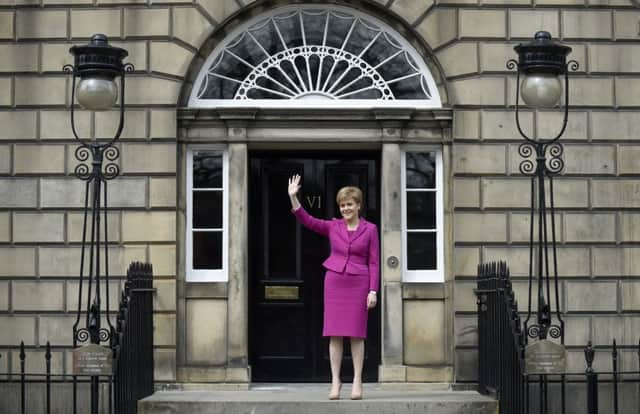Scotsman leader: Triumphalism must be resisted | Greece, forgotten and festering


But all winners are not equal, and the SNP were by far the biggest winner. The fact the SNP fell short of an overall majority – just – should not overshadow just how they displayed their dominance in Scottish politics. The winning of 63 seats is beyond question a powerful mandate. That it is their third term of office shows this is no passing fad.
The Conservative Party was the surprise winner of the night, as it is now safe to call Ruth Davidson, who was sparing in her use of the party’s name during her campaign. There can be no doubt that her engaging personality played a large part in her popularity, but she also played a very canny game in the two big issues of the election, tax and the constitution. On both she displayed a very simple and strong message. And who knew there were people who didn’t want to pay more tax or there were Unionists within the Labour party? Well, not Kezia Dugdale apparently.
Advertisement
Hide AdAdvertisement
Hide AdSo the Tories were also big winners with their greatest haul of Holyrood seats and the position as second biggest party.
The Greens were also winners, but just how big remains to be seen. Although they have six seats in the parliament their real value lies in what deals the SNP might be prepared to make in return for backing in key areas. Although Ms Sturgeon is to form a minority government she must hope there are alliances on the cards between – in some areas – like-minded people.
And the Lib Dems were the smallest winners, in fact they have the same number of seats as last time, but their victories in Edinburgh West and North East Fife will feel good.
The losers, yet again, were Scottish Labour. Yesterday Ms Dugdale expressed regret that Scottish voters have not moved on from the arguments over the constitution. Perhaps it is simply a consequence of her inexperience as a leader, although there were older heads to advise her. But then again it is not rocket science to see that a party that supported the Union would contain Unionists, and her weak stance on independence was only going to send them in one direction.
If anyone thought that last year’s trouncing in the Westminster elections would be the party’s nadir they have been forced to think again. Publicly there is backing for Dugdale to remain, despite the flaws in her campaign, but that is probably because there is no queue forming behind her for the job.
But now the parties must understand that the election is over. They must now get on with the serious business of running the country, not running each other down.
In her speech outside Bute House Ms Sturgeon said that it was her duty to rise above party politics, and that she realised she had been given a “precious opportunity to change this country for the better”. That’s a great start, now she needs to keep to that. The other parties need to realise they must do that, too.
Greece, forgotten and festering
If Britain was the sick man of Europe, Greece is now the forgotten man of Europe. It has now lived with six years of austerity – real austerity, not our British pale version – and one quarter of the workforce is unemployed.
Advertisement
Hide AdAdvertisement
Hide AdAnd now it still goes on, with a three-day general strike being called, and make no mistake it will impact millions of lives as binmen, bus drivers and council officials withdraw their labour.
Greece was also in the front line for the migrants crisis and receives very little financial help to deal with more than a million refugees making their way to their shores, of whom 50,000 are still in the country, many awaiting the outcome of asylum applications.
As you might expect, having been given six years warning, the eurozone is now better able to deal with a possible Greek exit. But eurozone member states have given the Greeks bailouts worth more than €300 billion and that is still not enough.
The truth is that Greece is in the situation it is in because it was wrongly allowed to become part of the euro simply because of the political kudos it gave the other states of the European Union.
What needs to happen is the country is given more help in dealing with its debt problem. It is never going to be a quick solution and it must recover and get back on its feet before it will be able to re-start its economy.
The threatened British exit from Europe has become the crisis that everyone in the continent is focusing on. The switch of the focus of the migrant crisis from the beaches of Greek islands to the cities and towns of Central Europe means an ongoing tragedy is being ignored.